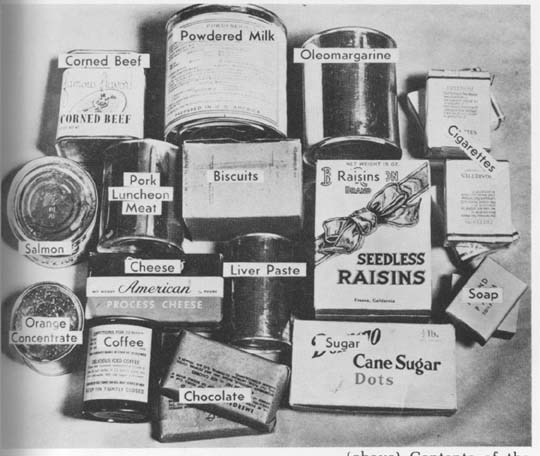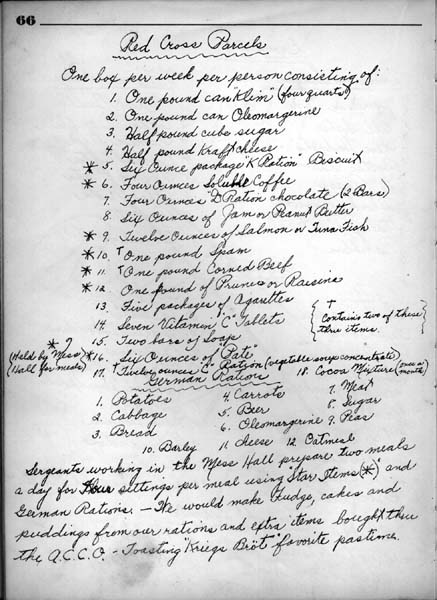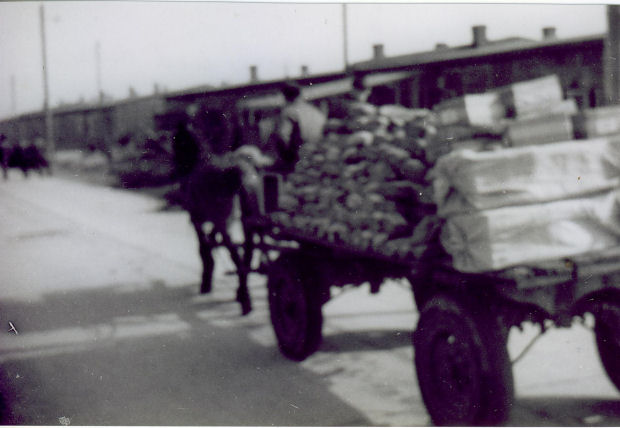Contents:
![]() Induction into the Army Air Corps
Induction into the Army Air Corps
![]() Grounded and wounded, but alive
Grounded and wounded, but alive
![]() The
German, the White Russian and me
The
German, the White Russian and me
![]() The Frankfurt
The Frankfurt
interrogation center
![]() Eat, drink, smoke, and be
Eat, drink, smoke, and be
creative
EAT, DRINK, SMOKE AND BE CREATIVE
We were each allowed one Red Cross parcel of food and supplies. When I first got there, the parcels arrived about once every two weeks, but as the war effort began to weaken Germany, the parcels came less often. We were allowed to take out the cigarettes and the chocolate bar. The rest was turned over to the communal cook shack or mess hall. The cooks mixed this with the provisions provided by the Germans.

Red Cross Parcel

Red Cross Parcel Contents Listed
The Germans gave us the same food the German populace was getting. It consisted primarily of barley and potatoes and, sometimes, horsemeat. We had cabbage, but no other vegetables. We had barley soup for breakfast every morning. The cooks wouldn't bother to scrape out the bugs and worms. So, when it was served to us in the bowl, we scraped them out.
We also received Black bread that was baked in Barth. We got one loaf per person per week, I think. Each loaf weighed over two pounds. The filler used was sawdust. The German people and guards ate the same thing. The German officers occasionally got a loaf of white bread similar to French bread. This was rare, and became rarer still as the Germans continued to lose the war.

Bread Arriving at Camp
The Red Cross parcels contained dried fruit. Some of the prisoners would save the fruit when it was served to them in the mess hall until they had a gallon or so. The prisoners had built a still from old one pound tins in which the Red Cross had sent powdered milk. The dried fruit mixture was placed in the cooker and distilled to produce an alcoholic beverage.
One evening, two prisoners had too much to drink, and decided they would escape "over the wire." They got to the warning wire and the guards in the towers shouted at them to go back. They kept on running and started to climb the fence. One was killed halfway up the fence. The other was killed on top of the fence.
This didn't stop the production of alcohol, however.
Cigarettes were the medium of exchange instead of money. In each Red Cross parcel there were two packages of cigarettes. Each cigarette was worth 27 cents. We also used cigarettes to bribe the guards to bring us things from outside that were not available to us within the camp.
Forty-six years later in Oklahoma City, I met with the men who were my roommates in the prison camp. I learned about other things they made. Only three men were not able to attend the meeting. Two had passed away, and one had Alzheimer's disease. The men showed things they had made. In addition to the bellows, they had purchased ice skates from the German guards and then disassembled them and used the blades to make a pair of wire cutters. Rocky Flint, who was in the bunk above me, got a supply of wire. He used the wire cutters to make springs for his bunk.
We listened to a radio in the camp to keep abreast of the war's progress. The Germans constantly tried to find this radio, but it was used only to hear the BBC broadcast for approximately 10 minutes, then dismantled. Each part was assigned to a different person. The German guards and officers would come into our mess hall to find out what was going on with the war, because it was not consistent with what they were being told.
